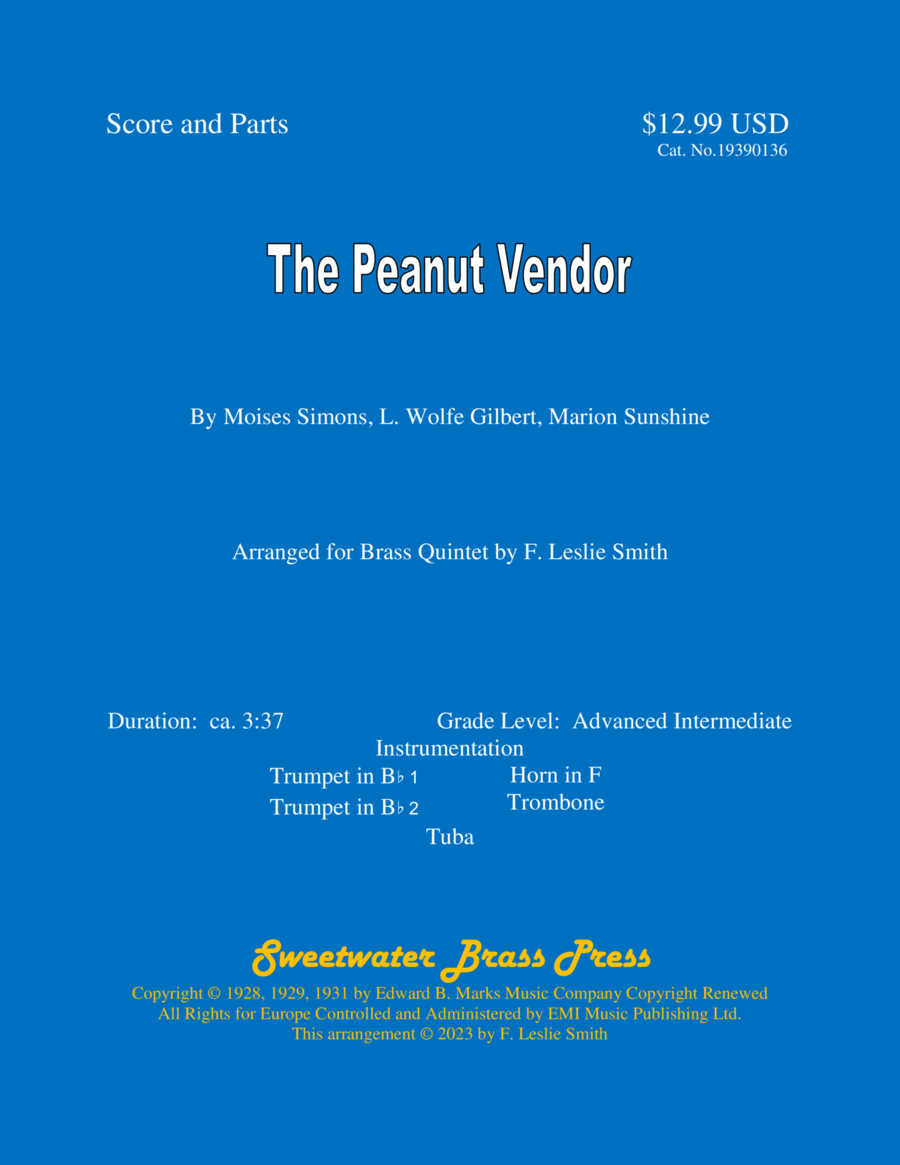Brass Quintet Horn,Trombone,Trumpet,Tuba - Level 4 - Digital Download SKU: A0.1221432 By Stan Kenton & His Orchestra. By L. Wolfe Gilbert, Marion Sunshine, and Moises Simons. Arranged by F. Leslie Smith. Jazz,Latin,Multicultural,Pop,World. 39 pages. Sweetwater Brass Press #817754. Published by Sweetwater Brass Press (A0.1221432). Can a brass quintet sound like Stan Kentonâs 19-piece big band? No, not really:  no saxophones, no rhythm section, no Milt Bernhart, no Maynard Ferguson, no Bill Russo, no Conte Candoli, no . . .  Well, you get the picture.  But five brass instruments can play in the Kenton style.  And thatâs what this is:  âThe Peanut Vendorâ in the style of the Stan Kenton Orchestra.   Moisés Simonsâ âEl Maniseroâ (âThe Peanut Vendorâ) was first recorded in the late 1920s.  The melody was relatively simple yet exotic sounding; the lyrics, a Cuban street vendorâs pitch for selling his bags of peanuts.  Consumers bought more than a million copies of the sheet music, and the song supposedly led to a ârumba crazeâ in the U.S. and Europe (although the song is not really a rumba!).     Don Azpiazú and his Havana Casino Orchestra recorded the song for RCA Victor in 1930 with Antonio MachÃn on the vocal; its sales may well have been more than the million-plus sheet music copies sold.     English lyrics were added by L. Wolfe Gilbert and Marion Sunshine and the song became âThe Peanut Vendor.â  One estimate is that nearly 200 recordings have been made.  Thatâs a lot of peanuts.    Stan Kenton revived âThe Peanut Vendorâ in 1947 when he first recorded it for Capitol Records.  His version was completely instrumental.  Rhythm and saxophones opened the number and established the background; later the trombone section added emphasis.  A trombone solo first stated the melody but eventually the five-person trumpet section took over with what one writer referred to as âshrieking dissonances.â  âThe Peanut Vendorâ subsequently became one of Kentonâs most requested numbers and he recorded it at least three more times.   This brass quintet arrangement, of course, has access to only two trumpets.  So the good news is that all five players get a chance with the melody.  Kentonâs extended opening trombone solo is shared by Trombone and Tuba.  The âshrieking dissonancesâ are performed not only by Trumpets but also by Horn in F and Trombone.  The bad news is that all five players have to take a turn with the continuing rhythmic background melody.  Written in 4/4 time, the suggested tempo is 184 BPM in a Latin style.  Kentonâs version is in B-flat major; this arrangement lowers it to A-flat major so that most notes are within the normal playing range of the instruments.  (Donât worry; the âshrieking dissonancesâ are still there!)     Completed in 2023, performance time runs about 3 minutes, 37 seconds. The arranger, Les Smith, will be happy to provide substitute parts (for example, treble clef baritone for trombone) at no charge.  He would like to receive your suggestions, comments, corrections and criticisms.  For more arrangements by Les, enter Sweetwater Brass Press (without the quotation marks) in the Sheet Music Plus or Sheet Music Direct search box.  (Also, purchase of this piece entitles you to your choice of another of his arrangements at no charge; send a copy of your purchase receipt directly to him at lessmith61@bellsouth.net.).
